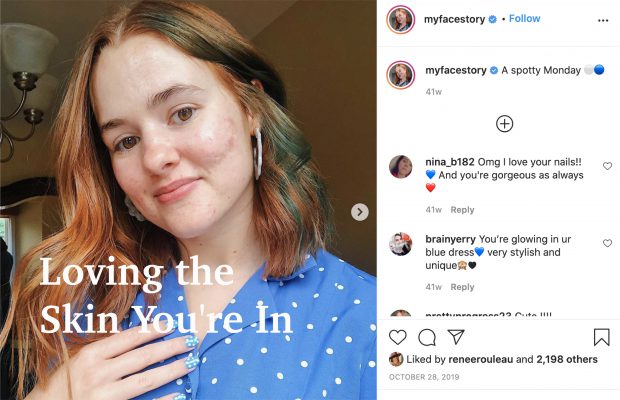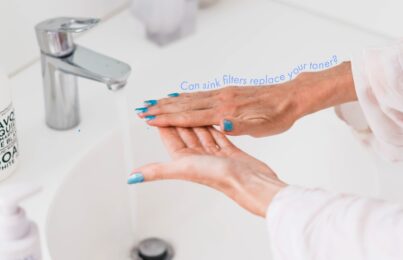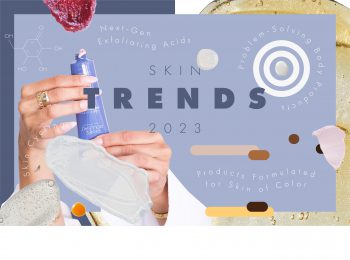Updated 12/29/21. Skin acceptance is being preached by more and more brands these days, but with the prevalence of social media, filters, and photoshop, it can be really difficult to actually practice what’s being preached. We hear that it’s okay to have pores on our cheeks and lines around our eyes, yet we rarely see this reflected on Instagram or on beauty brands’ websites.
- Skin Experts Weigh In
- Meet the Skin Experts
- What’s the Number One Thing You See Clients Struggling with When It Comes to Skin Acceptance?
- What’s Your Best Advice For Someone Struggling to Accept Their Skin?
- What Do You Wish People Would Focus on Less When It Comes to Their Skin?
- What Has Been Your Own Biggest Challenge When it Comes to Skin Acceptance?
- Paula Kana’an, L.C.S.W; Therapist
- Kali Kushner, Skin Positivity Advocate
I’ve helped thousands of clients with their skin in the more than 30 years I’ve been an esthetician, and I know how strong the connection between skin and self-perception is. To dig deeper into how we can work toward achieving skin acceptance, I spoke with other skin experts in my field, a therapist, and a skin positivity advocate.
Skin Experts Weigh In
One of the things I love most about my profession is that it gives me access to a wonderful, supportive network of skincare professionals (many of whom I’m also lucky enough to call friends!). Here’s what they had to say about skin acceptance based on their experiences.
Meet the Skin Experts
- Jordan Samuel — Esthetician; Founder & CEO, Jordan Samuel Skincare
- Joanna Vargas — Esthetician; Author; Co-founder, Joanna Vargas Skin Care
- Dija Ayodele — Esthetician; CEO, West Room Aesthetics
- Shani Darden — Esthetician; Founder, Shani Darden Skin Care
- Caroline Hirons — Esthetician; Author; Industry Expert
What’s the Number One Thing You See Clients Struggling with When It Comes to Skin Acceptance?
Jordan: That texture is perfectly normal. Between magnifying mirrors and the filters on social media, clients have started to have unrealistic views of what “healthy skin” looks like. They end up beating their skin into submission to achieve these unrealistic results, which more often than not creates more issues. This recent spike in a focus on NO pores, NO texture has created more inflammation and irritation than I remember ever seeing when I first started out in the industry.
Dija: I generally see people struggling to accept their particular skin type and skin condition. Instead of working with what they’ve got and making the most to optimize their skin health, a lot of people are after an imaginary skin, which may be unrealistic for them.
Shani: Two of the main things I see my clients struggling with when it comes to skin acceptance are wrinkles and aging in general.
What’s Your Best Advice For Someone Struggling to Accept Their Skin?
Jordan: Look at the bigger picture, and always be realistic. People look at issues with their skin as failures. Whether it’s breakouts, pigmentation, or wrinkles, none of these concerns are failures. Skin is complicated!
Joanna: I encourage clients to think of one positive thing they did that day or one quality they like about themselves as they wash their face at night. It sounds funny, but the truth is, most people spend that mirror time usually focusing on their flaws. It’s not healthy for anyone to do this to themselves, and it can really change your perception of yourself if you try and focus on the good stuff.
Dija: Stop comparing. Skin is such an individual concept that it makes more sense for you to seek professional advice on how to manage yours to the best of your ability. Don’t be swayed by what other people are doing or shiny products on social media. You’ll have your best skin when you take the time to understand what you’re working with.
Caroline: Get rid of your magnifying mirror. It is going to magnify everything you don’t like about your face when a normal mirror is going to show what you look like to everyone else. You have to love and own the skin you have and not worry about everyone else’s. The key to good health is knowing your skin so well that when something is off, you can tell. Don’t give yourself a hard time. That image of perfection doesn’t exist.
Renée (me!): When people have breakouts, it’s a loss of control. I like to remind them that they have more control than they think. People often make blemishes last longer by doing too much instead of trying to be in sync with Mother Nature. I always tell my clients, “We can’t stop you from ever getting a breakout again, but we can control what happens once you get a blemish so it goes away as quickly as possible.” Knowledge is power, and this helps flip the narrative and empower them.
What Do You Wish People Would Focus on Less When It Comes to Their Skin?
Joanna: Our need for perfection is toxic. Instead of focusing on what isn’t perfect about your skin, I would rather clients focus on their routine, sleeping well, and healthy habits.
Dija: Pores and dark marks from hyperpigmentation. Everyone wants closed pores, which is unobtainable. For a lot of my Black clients, it’s hyperpigmentation. I always try to explain that it’s the mechanics of Black skin—we will naturally hyper pigment at the first sign of trauma or inflammation. It’s not necessarily a bad thing, but it’s something that we can manage with robust skincare and treatments.
Shani: I wish people would stop worrying so much about aging and wanting to change their appearance overall. I love non-invasive treatments like microcurrent and LED light therapy along with retinol to transform your skin. I always recommend these things first, but it’s really about finding out what your skin needs. Above everything else, the most important thing is doing what you need to feel confident and beautiful in your own skin.
What Has Been Your Own Biggest Challenge When it Comes to Skin Acceptance?
Jordan: As an esthetician and brand founder, I put pressure on myself to always have a perfect skin day. That isn’t realistic. I have tried to embrace this and just go with the flow. It’s a work in progress but my skin is definitely better when going with the flow!
Joanna: My mother had the most beautiful skin I have ever seen. She was much darker than me, and I used to really hate how pale and freckled I was. My grandmother always told me to appreciate what I had and cherish it. She was so different from everyone else—she would wear sunscreen and a hat when everyone else would bake in the sun. It was a message that always resonated with me, so my freckled face hasn’t been in the sun unprotected, ever. It’s not always easy feeling different, but it was nice to have someone tell me to love myself anyway.
Shani: After I had my first daughter, I started to get melasma, which is just so hard to treat (yet not impossible). I’ve had to learn to accept that it’s going to flare up from time to time and I have to do my best to treat it and maintain it!
Renée: I am a recovered skin picker, so I am very compassionate to those who struggle with this and understand how much it stems from a loss of control. I have dealt with my own acne, particularly cystic acne, and couldn’t keep my hands off of my face when I was younger. It’s actually why I became an esthetician. When I found out there was a profession where I could get paid to pick at people’s skin, I knew I had found my calling! LOL
Paula Kana’an, L.C.S.W; Therapist
Paula is a therapist and licensed clinical social worker with over 15 years of experience. We spoke about how skin can affect our mental health as well as coping mechanisms to help keep negative thoughts at bay.
“I, as well as several of my children, have struggled with acne,” Paula said. “It is painful physically as well as emotionally. I hope to share with you some things that might be helpful to you on your journey to better skin health!”
How Can People Break Compulsive Skin Habits, Whether It’s Over-Cleansing, Picking, or Just Over-Analyzing?
“As a person who has experienced cystic acne, I can certainly relate to how hard it is to not pick at a blemish or resist the compulsion to over-cleanse,” Paula said. “After all, our face is the first thing that others see. It represents who we are to the world, or so we think. There are a few things people can do to reduce their [compulsive] tendencies.”
“The first step is to speak with a professional skincare consultant about healthy expectations for their skin, what they can do to reduce acne flare-ups and information about best practices. Institute a simple skincare regime that works for you. Try not to overcomplicate things. It has helped me to write down the products and the order in which I apply them.”
“Once you have a routine, stick to it. It’s easy to constantly look in the mirror checking, double-checking, and triple-checking one’s skin. If you find yourself doing this, “thought stopping” can be helpful. Thought stopping is exactly what it sounds like—begin by recognizing that you are having a thought. It might sound like, ‘Oh my gosh! Everyone can see this huge pimple on my nose! I’m so embarrassed.’ When these thoughts come into your mind, speak to yourself gently and with reassurance. ‘Hey, I notice that you are thinking a lot about that pimple. It will go away, but for now, let’s think about something else.'”
“Getting into the present can be helpful by focusing on music or a conversation you are having. If that is still not working, try a rubber band on the wrist, gently pluck the band when you are having the thought to cleanse or pick. This is a physical reminder to move on to a different thought.”
What Issues Do You See Social Media Causing, and What Do You Recommend as the Antidote?
“Social media can create unrealistic expectations for people both young and old. It allows people to present to others only what they want them to see and it’s as though people are creating a brand versus a person.”
“One way to combat this is to not download filtering apps and to participate with others on social media who don’t use them either. Limiting the time spent on your phone can also be helpful. For example, set a timer and allow yourself fifteen minutes of check-in time in the mornings. I take a week or two off from social media every now and then just to reduce the outside noise and input of others so I can reconnect with my authentic self. It honestly helps me to feel more centered and self-confident.”
How Can We Appreciate Ourselves and Our Skin More?
“One can be affected by their skin at any age. In fact, I was just to the dermatologist for my yearly skin exam and questioned how a 52-year-old can still be experiencing acne. It just seems unfair that I am getting acne and wrinkles at the same time! I reminded myself that skin is only one aspect of who I am. Skin is an organ. It has a medical use for us, it keeps things out of our body that aren’t supposed to be there. Thinking about skin within the correct context is important in allowing us to correctly value it and ourselves.”
“At times, people can place too much value on an unobtainable quest for flawless skin. Discounting our positive attributes and hyper-focusing on skin flaws doesn’t allow for a full sense of self. Acknowledging positives can assist one in not being stuck solely focusing on the negative. If it helps, make a vision board of many positive things that you like about yourself, ask friends and loved ones for positive attributes that they appreciate about you, talk to yourself in front of a mirror and be honest about the things that you appreciate about yourself, both externally and internally. Celebrate you!”
Kali Kushner, Skin Positivity Advocate
Kali is a skin- and acne-positivity advocate whose Instagram account, myfacestory, is dedicated to sharing a real, unfiltered look at her journey with acne and acne scarring. She started her account as a way to document her experience and now has over 80,000 followers.
“My account has changed a lot over the years,” Kali said. “From talking about different acne treatments and tracking my Accutane journey, to talking about all things self-love and connecting with a larger, like-minded community! I’m so happy with the way it’s evolved.”
What Do You Think Companies Can do to Promote Skin Acceptance?
“I would like to see more diversity,” Kali said. “More ages, more skin tones, and definitely more skin types. With photoshop being so prevalent, acne, scars, age spots, and wrinkles are the last thing that we see represented. I worry how that might affect future generations, to never see real skin portrayed—to never see themselves portrayed. I think companies can do a better job of contributing to skin positivity and acceptance by understanding it.”
What Does Skin Positivity Mean to You?
“Skin positivity doesn’t mean you’re not treating your skin, because no one WANTS to have painful cystic acne. It means that, no matter what your skin looks like, you love it unconditionally. Some people struggle with acne for years or have permanent scarring. Does this mean that they should hate themselves and their skin? Absolutely not! I still have to remind myself on a regular basis that my skin doesn’t define me. It’s one part of me but it’s not all of me, and honestly, it’s the most boring thing about me.”
I want to thank everyone who contributed to this post for their time and their input! This topic is near and dear to my heart and something I think we in the skincare industry are obligated to keep talking about. I hope this post has brought you some positivity and encouragement.
*Interviews have been edited and condensed
Next, searches for fungal acne are up 500%—here’s what you need to know.
Celebrity Esthetician & Skincare Expert
As an esthetician trained in cosmetic chemistry, Renée Rouleau has spent 30 years researching skin, educating her audience, and building an award-winning line of products. Her hands-on experience as an esthetician and trusted skin care expert has created a real-world solution — products that are formulated for nine different types of skin so your face will get exactly what it needs to look and feel its best. Trusted by celebrities, editors, bloggers, and skincare obsessives around the globe, her vast real-world knowledge and constant research are why Marie Claire calls her “the most passionate skin practitioner we know.”



